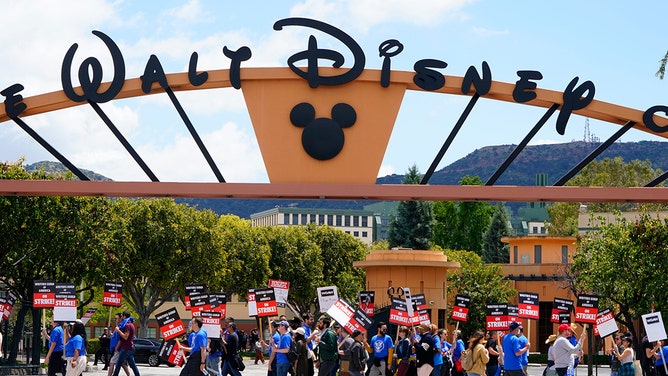## Disney’s Culture Wars: Are Employees Turning Against the Mouse?
The magic kingdom is facing a crisis of its own making. While Mickey Mouse waves and princesses twirl, behind the scenes at Disney, a battle is raging over diversity, equity, and inclusion (DEI).

According to Outkick, Disney employees are sounding the alarm, accusing the company of “capitulating” to conservative pressure, specifically from former President Donald Trump. They claim the company’s recent actions betray its commitment to creating a welcoming and inclusive environment for all.
But is Disney truly abandoning its DEI initiatives? And what are the implications for the company, its employees, and its future? This article delves into the heart of the controversy, exploring the perspectives of both sides and examining the potential consequences of this cultural clash.Disney’s DEI Debacle
The Walt Disney Company, once a champion of diversity and inclusion, has recently faced backlash from its employees over changes to its DEI policies. This shift has led to frustration, betrayal, and uncertainty among Disney employees, causing concern about the future of diversity initiatives and the company’s political stance.
Employee Backlash Against Company’s Shift
Disney employees have expressed their dissatisfaction with the company’s decision to move away from DEI policies, which they believe are being abandoned in an attempt to appease conservatives. According to a Deadline report, one employee stated, “It’s like Chapek on steroids!” in reference to former CEO Bob Chapek, who briefly tried to distance Disney from politics before being overwhelmed by demands to interfere in Florida legislation, resulting in significant financial losses.
Another employee expressed concern about the uncertain future of diversity initiatives, asking, “What’s next? Where do we go from here? What do we stand for now, keeping MAGA happy?” The report also revealed that some employees felt betrayed by current CEO Bob Iger, who they believed would support their progressive values.
What’s Next for Disney’s Diversity Initiatives?
The fallout from Disney’s DEI decision has left employees questioning the future of diversity initiatives within the company. Some are concerned that removing a transgender storyline from a children’s show, Pixar’s Win or Lose, is an attempt to “pander to MAGA,” while others speculate that the company’s shift is a response to embarrassment over a $15 million settlement paid to former President Donald Trump’s foundation and museum.
Overall, Disney’s employees are frustrated with the company’s attempts to “win over conservatives” rather than focusing on high-quality, family-friendly entertainment that appeals to a broad audience. This shift in priorities has negatively impacted Disney’s performance and stock trends, demonstrating the dangers of ideological extremism in the entertainment industry.
The Fallout of Disney’s DEI Decision
Disney’s decision to alter its DEI policies has resulted in a series of consequences, both for the company and the entertainment industry as a whole. These consequences highlight the importance of avoiding political debates and focusing on quality entertainment that appeals to a wide range of viewers.
Pandering to Conservatives or Pandering to Extremists?
Disney’s attempt to appease conservatives may be misguided, as it risks alienating the broader audience and becoming entangled in political debates. By focusing on quality entertainment that transcends political boundaries, Disney can avoid these issues and maintain its core business.
The Consequences of Extreme Leftist Views
The impact of extreme leftist content on Disney’s performance and stock trends is evident in the decline of the entertainment industry’s revenue and viewership. Between 2010 and 2024, the average domestic box office per film dropped from $16.3 million to $12.7 million, adjusted for inflation, demonstrating the negative effects of incorporating political agendas into entertainment.
A Lesson in Common Sense
Disney’s experience with DEI policies and transgender storylines serves as a lesson in creating high-quality, family-friendly entertainment that appeals to a broad audience. By avoiding political stands and focusing on its core business, Disney can avoid the dangers of ideological extremism and ensure its success in the entertainment industry.
The Problem with Incorporating Political Agendas
Disney’s attempts to incorporate DEI and transgender storylines may be alienating audiences, highlighting the importance of creating entertainment that appeals to a wide range of viewers rather than catering to a specific political ideology.
The Need for Neutrality in Entertainment
By avoiding political stands and focusing on its core business, Disney can prevent the negative consequences of ideological extremism in the entertainment industry. This neutrality allows the company to maintain its reputation as a provider of high-quality, family-friendly entertainment that appeals to a diverse audience.
Conclusion
The recent controversy surrounding Disney and its approach to DEI (Diversity, Equity, and Inclusion) highlights a growing tension within the company and the broader cultural landscape. Employees, particularly those from marginalized groups, are vocal about their concerns that Disney is “capitulating” to pressure from conservative voices, specifically citing the company’s recent response to Florida’s “Don’t Say Gay” legislation. They argue that these concessions undermine the progress made in fostering an inclusive workplace and sending a message of acceptance to its diverse audience.
This situation raises crucial questions about the role of corporations in navigating politically charged issues. Should companies prioritize appeasing all stakeholders, even when those demands conflict with their stated values? Or do they have a responsibility to stand up for their principles, even if it means facing backlash? The answer, undoubtedly, is complex and multifaceted. However, the unfolding drama at Disney serves as a stark reminder that the fight for inclusion is far from over. It is a fight that will continue to be waged in boardrooms, on picket lines, and in the hearts and minds of consumers everywhere. The choices Disney makes in the coming days and weeks will have far-reaching implications, not just for the company itself, but for the future of representation and acceptance in the entertainment industry and beyond.
Ultimately, the question remains: will Disney choose to be a beacon of progress or a symbol of surrender?
